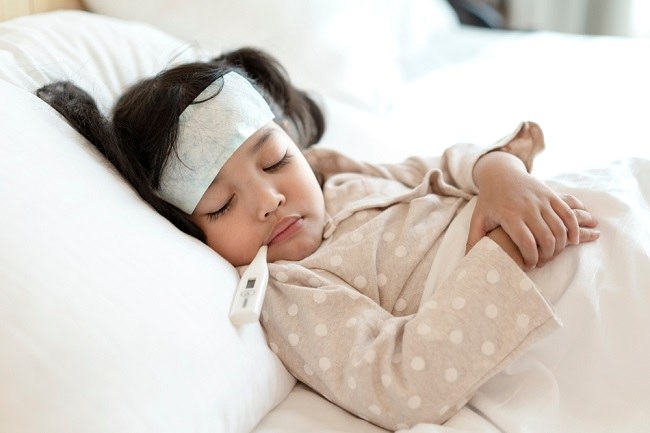6 Effective Ways to Overcome a Child's Fever at Night
How to deal with children with fever at night can vary, from giving warm compresses to administering paracetamol. sleep well, so quickly recover from fever.
Fever is a condition when the body temperature rises to more than 38⁰C. Fever is actually not a disease, but a symptom of a medical condition. Fever indicates that the body is fighting an infection.

In children, fever can also occur due to teething, after immunization, wearing clothes that are too thick, or experiencing heatstroke.
Fever can occur during the day or night. Actually fever can improve by itself and does not always indicate something dangerous. However, fever that occurs at night requires more treatment.
This is because fever at night can interfere with a child's rest. In addition, the health facilities available at night are also limited. Therefore, parents need to know various ways to deal with children with fever at night that can reduce their little one's fever.
Various Ways to Deal with Child Fever at Night
Fever that occurs at night, can make your little one cranky and can't sleep well. To handle this, here are some ways to deal with a child with a fever at night that you and your mother can do:
1. Give a warm compress
The first way to treat a child with a fever at night is to apply a warm compress. Mother can apply a cloth or sponge that has been soaked in warm water to the little one's forehead so that the fever doesn't disturb his sleep. Warm water will help lower his body temperature.
After giving a compress, Mother can dry her little one's body and change her wet clothes. This is done so that the Little One does not get cold and shiver.
2. Wear thin clothes
The next way to deal with a child with a fever at night is to wear thin clothes on the child. Avoid wearing thick and layered clothing.
Thick clothing can inhibit the decrease in your little one's body temperature and make him sweat. This can actually disturb your little one's sleep.
3. Give more to drink
Fever can cause your little one to lose fluids faster, even causing him to become dehydrated. This condition can cause complications and exacerbate the fever that is currently occurring. To prevent this, Mother can give your Little One more fluids. Apart from giving water, Mother can also give juice, herbal tea, broth, rehydration solution, and electrolyte fluids.
If your Little One is still breastfeeding, Mother can give more breast milk. In addition to preventing dehydration, breast milk is also beneficial for strengthening your little one's immune system against infection.
4. Maintain room temperature
Keeping the room in your little one's bedroom cool can help prevent his body temperature from rising. Mother can turn on the fan to cool the room temperature, and keep the air circulation smooth. However, avoid directing the fan directly at your little one's body because it can make him shiver with cold.
5. Make sure your child gets enough rest
The way to deal with a child with a fever at night is to make sure your little one sleeps well. You don't need to wake your little one to check his body temperature while he's sleeping, unless your little one seems restless. A good night's sleep is beneficial for helping the healing process of your little one's fever.
6. Give fever-reducing medicine
If several ways of dealing with a child's fever at night have been done but are still not able to reduce your little one's body temperature, he even looks fussy and restless, Mother can give him fever-reducing medicine. The use of this drug is beneficial to help your little one feel more comfortable, especially if the fever is accompanied by a headache or body aches.
The medicine that Mother can give is paracetamol or ibuprofen in the form of syrup or chewable tablets. Before giving medicine to your little one, read the instructions for use listed on the package first or according to the doctor's instructions. Avoid giving excessive doses or not according to the method of use.
Although generally it can be treated independently at home, Mothers need to be vigilant if your little one's fever is accompanied by the following signs:
- The child is less than 3 months old and has a fever with a rectal temperature reading of 38oC or more
- The child is more than 3 months old and has a fever with a temperature rise of up to 38.9oC or more
- The child is more than 3 months old and has a fever for more than 2 days
- Cries continuously and is more fussy than usual
- Shortness of breath
- Skin rash
- Looking lethargic
- Looking confused
- Headache
- Stiff neck
- Lack of appetite
If your little one experiences any of the signs above, don't delay taking him to the doctor for an examination. In addition, if you have tried various ways to deal with a fever at night as above, but your little one's condition does not improve, check with your little one to the doctor to get the appropriate treatment.
Label : Family
Comments
Post a Comment